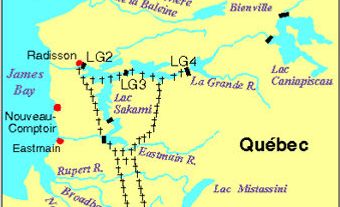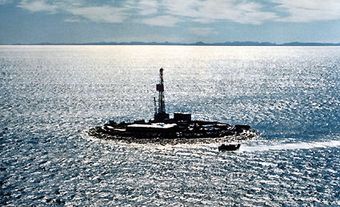This article was originally published in Maclean’s magazine on December 9, 1996. Partner content is not updated.
Call it the Great Mall of China. Two years ago, Prime Minister Jean CHRÉTIEN led nine premiers and more than 400 business people on a mission to vastly expand trade with the world's most populous market.CANDU Reactor Deal Controversy
Call it the Great Mall of China. Two years ago, Prime Minister Jean CHRÉTIEN led nine premiers and more than 400 business people on a mission to vastly expand trade with the world's most populous market. The results of the "Team Canada" trip have been impressive: nearly $9 billion worth of confirmed deals involving Canadian banks, financial and legal services, and manufacturing ventures. Yet trade with what is also the world's largest totalitarian state is never free of controversy. Last week, Chrétien was in China again to conclude the biggest single Canada-China deal ever: a $4-billion contract for the construction of two of Canada's CANDU 6 nuclear reactors to supply electricity to an industrial region south of Shanghai. Federal officials hailed the sale as a major step in building Canada's presence in China. But at home, the sale provoked an explosion of protests.
To critics, it presented the deplorable spectacle of Canada selling sensitive technology to a country known for its human-rights violations and poor environmental record. At a time when China has launched a new crackdown on dissidents, declared René Goldman, a professor of Chinese studies at the University of British Columbia, Ottawa "is bending over backwards to oblige China. I have never been so ashamed to be a Canadian." A coalition of environmental organizations threatened legal action. They were angered at regulatory changes approved by the federal cabinet last month that exempt the CANDU sale from Canadian environmental assessment.
In Vancouver, the sale triggered brief violence as students tussled with protesters to prevent them from burning a Canadian flag near a statue commemorating the 1989 massacre of pro-democracy activists in Beijing. Other critics challenged the terms of a $1.5-billion Ottawa-backed loan that helped the federally operated ATOMIC ENERGY OF CANADA LTD. (AECL) swing the deal. Some also questioned the wisdom of making Canadian nuclear know-how and materials available to the at times belligerent Asian giant. "I don't think," said Roy Culpeper, president of the Ottawa-based North-South Institute, "that China is necessarily a country that can be trusted to keep the peace."
Despite the furor, the deal's signing ceremony in Shanghai was a high point in a week-long Asian trip by Chrétien that began at a meeting of Pacific Rim leaders in Manila, Philippines, and concluded with a visit to Japan. The sale appeared to signal a new closeness between Canada and China. After the ceremony, Premier Li Peng - known to his critics as "the butcher of Beijing" for his role in ordering the bloody 1989 clampdown - joined Chrétien in some uncharacteristic clowning at the opening of the new Shanghai offices of Canada's Manulife Financial insurance company. When Chrétien jokingly tried to place a ribbon on Li's head, he was rewarded with a friendly shoulder squeeze from Li.
Such scenes also demonstrate China's growing ability to get the world to deal with it on Beijing's terms despite its repressive policies, exemplified by the stiff 11-year prison sentence imposed in October on political dissident Wang Dan. Chrétien conceded he did not use the term "human rights" during a meeting with Chinese President Jiang Zemin in Manila, preferring milder references to "the rule of law." U.S. President Bill Clinton agreed to an exchange of state visits with Jiang, a long-sought plum for China, despite a lack of progress on other issues, including human rights, in their Manila session. And last week, South Africa stunned old friend Taiwan with an announcement that it would switch recognition to Beijing.
Lured by the gradual opening of China's once-closed market and its population of 1.2 billion, foreign governments and businesses are scrambling for a share of the action. "China is being courted," said Robin Hibberd, a Hong Kong-based Bank of Nova Scotia vice-president. "And they're going to strike a very hard bargain, because if you aren't interested in a deal, there is another guy behind you who's just as eager as you are."
For the CANDU sale, critics claimed, Ottawa was willing to rewrite Canadian environmental rules to avoid offending China. A regulation abruptly enacted by the federal cabinet on Nov. 7 exempted deals like the reactor sale from the stringent provisions of the Canadian Environmental Assessment Act, which require environmental impact studies and public consultation for ecologically sensitive projects involving the federal government. Ottawa officials maintained that the new order simply clarified the law. "It was never our intention," International Trade Minister Art Eggleton told Maclean's, "that the act would apply to projects carried out in other countries."
Opponents of the CANDU deal stuck to their guns, arguing that despite the regulatory change Ottawa is still legally obliged to carry out a review. In a letter to federal officials, Elizabeth May, executive director of the Ottawa-based Sierra Club of Canada, demanded that the government launch an environmental assessment of the China deal within 30 days or face a court challenge to the sale.
Ottawa officials brushed off the court threat as unlikely to succeed, and rejected charges that China's past record of giving technical assistance to Pakistan, which is believed to be trying to develop nuclear weapons, makes it a poor security risk for the CANDUs. Ottawa insisted that adequate safeguards were in place, because the two Chinese CANDUs will be open to inspection by officials from the Vienna-based International Atomic Energy Agency. "We're fully confident," said a foreign affairs spokesman in Ottawa, "that our nuclear trade with China will be for peaceful purposes only." Asked whether CANDU plutonium could be used for Chinese weapons, Zhang Jun Sheng, a senior official at China's de facto embassy in Hong Kong, the Xinhua news agency, told Maclean's: "It won't happen. China is for global nuclear disarmament. It has already stopped all nuclear testing anyway."
Environmentalists also expressed concern over whether the Canadian reactors would be safely operated once they are up and running at Qinshan, about 125 km south of Shanghai. During the construction phase, AECL will be in charge, and the agency will train Chinese reactor operators in Canada. But once the operational CANDUs are in Chinese hands - probably by 2003 - Canada will have no say in how they are run. Federal officials insisted that there is no reason to doubt Chinese competence, since two French-built PWR reactors have been operating for two years at Daya Bay, 70 km northeast of Hong Kong, and a Chinese-built reactor is running at Qinshan. "The Chinese," noted AECL spokesman Rhea Cohen, "have considerable experience." Still, local Chinese in Hong Kong have long expressed fears about safety at Daya Bay. The Hong Kong government will test its emergency response plan this month, but says it will not release results because "it may cause panic."
The sale brings to 12 the number of CANDUs sold overseas since the mid-1970s. That is a badly needed boost to the flagging fortunes of the AECL, which - like reactor builders in other Western nations - has seen domestic sales dry up in the wake of the disastrous 1986 nuclear meltdown at the Soviet Union's Chernobyl installation. Though Ottawa promotes the CANDU as the cleanest nuclear reactor in the world, environmental critics note that its efficiency and safety records have declined in recent years. After several mishaps at Ontario Hydro's nuclear complex in Pickering, Ont., the watchdog ATOMIC ENERGY CONTROL BOARD of Canada was expected to renew Pickering's operating licence for only six months instead of the customary two years. "This inherently unsafe technology can be run only under conditions of intense public scrutiny," said Norm Rubin, a spokesman for the Toronto-based environmental organization Energy Probe. "Imagine trying to run it in a country like China where the public is not entitled to ask any questions at all."
Despite the CANDU uproar, Canadian firms are certain to go on looking for opportunities in China - and elsewhere among the fast-industrializing nations of Southeast Asia. In a surprising development last week, Quebec officials said that Premier Lucien Bouchard planned to reverse the policy of his predecessor, Jacques Parizeau, and take part in a trade mission Chrétien is scheduled to lead to South Korea, the Philippines and Thailand in January. But Quebec deputy premier Bernard Landry added that it would be Bouchard's "duty" to talk about Quebec sovereignty to foreign leaders. In Tokyo, Chrétien downplayed that potentially disruptive element, saying that the premiers on Team Canada trips leave domestic differences behind.
Meanwhile, buoyed by their initial success, AECL officials are trying to persuade the Chinese to buy two more CANDUs. That may be an uphill battle - China prefers not to give too much business to a single supplier. And further sales would only reignite the debate over whether Canada should be selling nuclear technology in China at all. Michael Duke, a veteran China-watcher at the University of British Columbia, does not buy the argument that economic sanctions by industrialized nations will increase pressures for reform inside China. "Even Chinese dissidents want Western countries to continue trading with China," said Duke, "on the grounds that more trade will produce openness in the long run." That is clearly a view the Chrétien government will cling to as it defends its controversial sale.
Maclean's December 9, 1996

 Share on Facebook
Share on Facebook Share on X
Share on X Share by Email
Share by Email Share on Google Classroom
Share on Google Classroom


